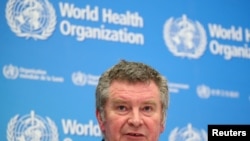The World Health Organization says the dramatic increase in the number of coronavirus cases in China’s Hubei province is due to a change in the way suspected cases are diagnosed and reported.
The virus has not dramatically spread but the reclassification has boosted China’s national case toll to nearly 60,000. The WHO says the number includes 13,332 clinically confirmed cases alone in Hubei, the epicenter of the disease outbreak.
WHO officials say they are not all new cases. Most, they say, go back days and weeks and are only now being reported.
The executive director of the WHO's Health Emergencies Program, Michael Ryan, said the cases are not based on a clinically confirmed instance, but on lesser symptoms exhibited by patients.
“This allows clinicians to move and report cases more quickly. Not having to wait for lab confirmation, ensuring that people get to clinical care more quickly also allows public health responses in terms of contact tracing and other important public health measures to be initiated. … So, we are not dealing, from what we understand, with a spike in cases of 14,000 on one day,” he said.
During the same day, the WHO said Hubei province confirmed 242 deaths, bringing the death toll in China to 1,350. Ryan notes that surge of cases and deaths inside China is not being reflected in the wider world. Cases in 24 countries outside China now number 447, including one death each in the Philippines and Japan.
Ryan said countries still have an opportunity to prepare for the potential spread of the virus. He said getting clinical trials of drugs and vaccines under way as quickly as possible is of great urgency.
He said efforts to tackle the outbreak will get a boost when a team of international experts starts arriving in China in coming days. He describes the multinational team as being composed of tough, first-class scientists from around the world.





